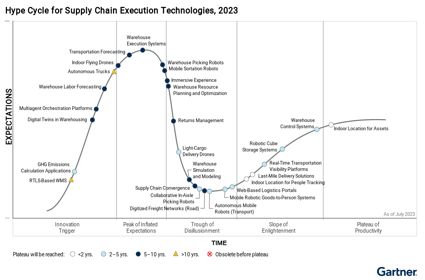Unlock The Future Of Transportation Now With Holistic Forecasting
Keith LaBotz - September 07, 2023

Transportation forecasting has long been a niche application for supply chains, but it's quickly becoming a mainstream necessity. Gartner® states, "Transportation forecasting solutions apply demand-sensing/forecasting techniques specifically aligned with transportation networks, hierarchies and planning constraints. Specialized transportation forecasting solutions offer robust, transportation-specific allocation methodologies that can translate customer, location and product demand into lane- and mode-specific shipping-demand projections."
As digitalization transforms supply chains into collaborative networks, traditional transportation planning will lose its efficacy. A holistic approach to transportation planning that aligns and harnesses the collective resources of partners will be required. The optimization potential is off the charts, and participation in holistic planning will not be optional.
One thing is clear about the future of transportation: holistic transportation planning is inevitable, and it must be a top priority in every company's digitalization strategy.
flexis AG is Recognized in Gartner Hype Cycle for Supply Chain Execution Technologies 2023, for Transportation Forecasting
Gartner recently acknowledged flexis as a Sample Vendor for Transportation Forecasting in the Hype Cycle™ for Supply Chain Execution Technologies, 2023. We believe being named for the fifth time in a row as a Sample Vendor underscores flexis AG's leadership in transportation forecasting and role as an innovator. In the realm of supply chain execution technologies, the report offers insights into emerging technologies shaping the future of supply chain execution, and it provides a 10-year outlook on the most significant technology trends. Gartner explains that "some macrotrends driving innovation in SCE:
- Improved decision making
- Agility
- Automation
- Ecosystem enablement
-Sustainability"
Stepping Into the Future with Holistic Transportation
To better understand the practical side of these concepts, let's explore the features of the flexis solution and its integration of transportation with supply chain management.
- Multi-dimensional Modeling: All planning-relevant structures (product, part, plant, market, time horizon) processes from S&OP, supply chain, and production environments in a multidimensional model. As changes in model variables occur, all supply chain functions, including transportation, adjust to ensure the optimal outcome.
- Scenario-Based Planning: The solution runs what-if simulations across the entire network, allowing companies to optimize inbound and outbound plans proactively.
- Sustainability Focus: Emissions can be measured per vehicle and route against corporate sustainability objectives and factored into planning decisions, promoting eco-friendly logistics.
With these features, transportation is a tightly integrated supply chain planning function instead of treating it as a separate discipline. As a result, shipping arrangements become more agile, adjusting in real-time to demand volatility and supply chain interruptions. This agility opens the door to another unexpected benefit - rapid innovation.
Holistic Transportation Planning Fuels Rapid Innovation
Holistic transportation planning facilitates agile logistics, and logistics agility is vital for more than allowing operations to adapt quickly to disruptions. It’s essential for the rapid innovation of business strategies:
- New business models emerge from reengineering supply chains and business processes.
- Changes to the business process often require changes in the underlying logistics.
- The success and pace of these transformative changes are primarily determined by logistics agility - the ability of logistics processes to adapt swiftly.
This agility benefits current operations and prepares businesses for significant future trends, such as the rise of digital freight exchanges.
Enabling a Brighter Future: Digital Freight Exchanges
Holistic planning readies shippers and carriers to leverage one of the most significant shifts in transportation history: digital freight exchanges.
Electronic freight exchanges are the most efficient solution for reducing the gross inefficiencies, like empty miles and idle drivers, that plague public and private fleets. As digitalization accelerates the pace of business, spot markets will continue evolving toward functioning as a commodities exchange for freight capacity.
Digital markets provide carriers and shippers with the lowest-cost, most sustainable, and agile transportation. Annual transportation contracts were our best tools for hundreds of years, but they run on borrowed time in a digital supply chain. Even when generated from ultra-sophisticated analytics, future freight demand and pricing guestimates cannot compete with supply chain networks optimizing logistics around real-time transportation markets.
The increased volume in the digital spot markets will drive the standardization of APIs for pricing, quoting, tendering, and settlement transactions, facilitating widespread integration. Shippers and carriers will holistic forecasting and routing capabilities will find it easiest to integrate these functions.
Conclusion
Holistic transportation planning is critical to enabling agile supply chains and rapid innovation in the digital supply chain. With its holistic transportation forecasting, flexis AG allows companies to increase efficiency, sustainability, and competitiveness and equips them to capitalize on future logistics trends
LATEST POSTS
- Understand Circular Economy in The Manufacturing Industry
- How Can Industry 4.0 IT Integration Be Achieved Smoothly?
- The Significance of Order Sequencing in Discrete Manufacturing
- How to improve your Supply Chain Management: The Power of Control Towers
- Optimizing Human Resource Scheduling in Manufacturing: A Technological Approach


